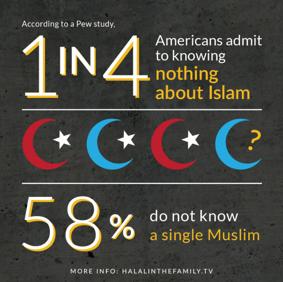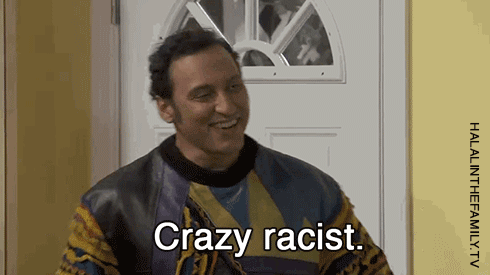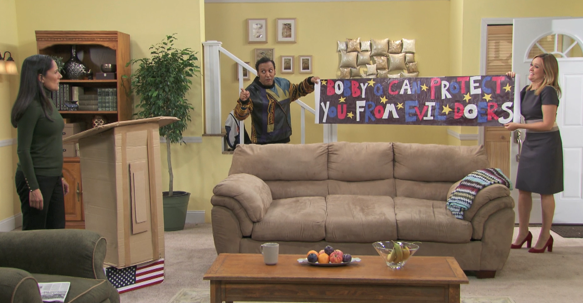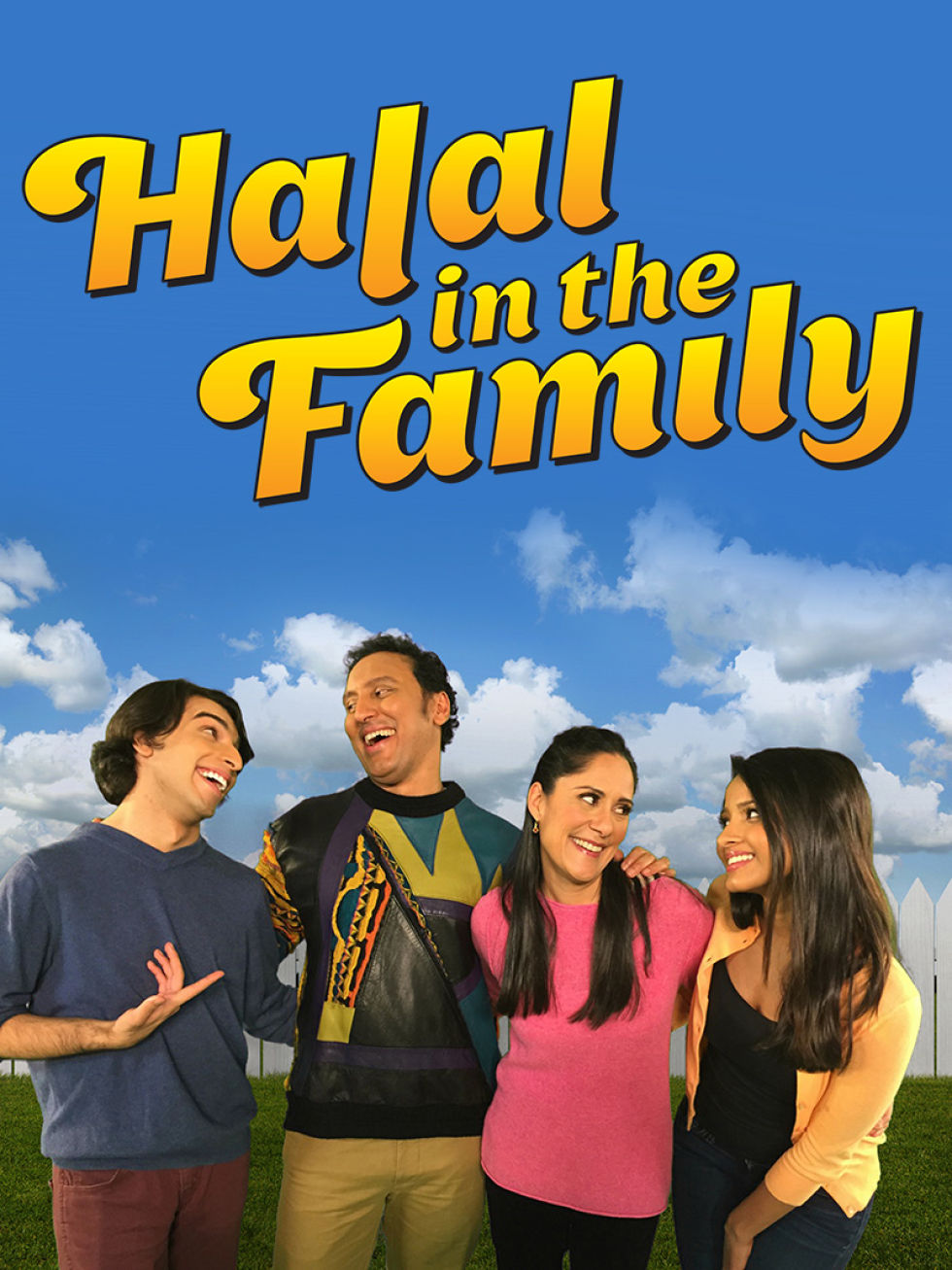You’ve probably heard a lot of buzz about actor and comedian Aasif Mandvi’s new project Halal in the Family, a comedy designed to counteract the rise of American Islamophobia. Originally “The Qu’osby Show,” a 2011 Daily Show sketch, Halal in the Family now has four episodes online.
Mandvi spoke with Heeb’s Megan Sass about the show’s creation, goals, and the similarities between cultural Judaism and Islam.
*****
What was the inspiration for the original “Halal in the Family” sketch from The Daily Show? When did you decide to turn this into a series?
In 2010, Katie Couric said, “Maybe what American Muslims need is their own Cosby Show to combat bigotry and racism and homophobia.” And so we sort of took that literally, the idea that The Cosby Show solved racism for black people in the ‘80s, you know, why couldn’t it do the same for Muslims? So we created a parody Cosby Show-type sitcom, and at the time it was called The Qu’osby Show. We shot it and aired it in front of a group of people and asked questions about it, and we did the whole piece on The Daily Show around and about that idea. It was pretty successful, and the whole seven or eight minute sitcom that we created, the parody, was actually put on The Daily Show website.
Years later I was approached to do something viral dealing with Islamophobia, you know, bigotry towards Muslims, and all that stuff. And I thought, “Well this would be a great way to do that, to revamp this idea of The Qu’osby Show.” Which then we decided to change the name to Halal in the Family, which actually I think is a funnier name. So we’ve now created four episodes of this sitcom parody about this all-American Muslim family that super wants to be seen as like more American than any American family out there. It really sort of satirizes the bigotry and the prejudice towards Muslims in America today.
Can you talk about the different elements of culture that will be represented in the series?
We made it issue based. So there’s an episode about surveillance, and that’s about cyber bullying. There’s an episode about protesting of mosques. So each one we took on a different issue that American Muslims deal with, and we took that issue and used that as the structure for each episode. So each episode actually deals with a different issue that American Muslims actually deal with today, whether it is daily prejudice to more institutionalized prejudice.
 Who are you most hoping to reach with this series? How do you approach reaching the Christian majority in America vs. other minorities in America?
Who are you most hoping to reach with this series? How do you approach reaching the Christian majority in America vs. other minorities in America?
I hope we reach as many people as we can. It felt to me like when we were creating this, we were speaking to the prejudice, and specifically the institutionalized prejudice that’s out there. So we were satirizing the absurdity of those prejudices. I mean obviously the Muslim American community I think, on some level, is going to support this, and hopefully make it viral in a way that it reaches a larger American populous. The statistics show that like 32% of Americans actually are friends with or actually know a Muslim, right? We’re countering that kind of statistic by creating something where you can laugh and also. . . in the same way The Daily Show kind of satirizes stuff . . . if you can take up issues with humor and satire, I think that you start to open up the conversation. You start to counter the narrative that the media and politicians want to put out there, which is this kind of institutionalized . . . . or rather, not institutionalized, but sort of very targeted bigotry towards Muslims that serves an objective for people, you know? It sensationalizes it, it gets people elected.
It’s kind of become the new homophobia, as the hot-button political issue. If I want to demonstrate that I’m “pro-American,” and “right-wing,” that’s what I need to call out, that’s the thing that I need to re-assure America I am in order to make them trust me.
Right. And obviously the show is absurd. The show is not presenting a real family. It’s presenting a kind of caricature of a family. But in that absurdity, it also points out the absurdity of the bigotry and the fear.
Look, there’s a fair amount of Islamophobia, I think, in Israel at the moment. Is there any hope that this project will reach outside of America?
I hope so. I have Israeli friends, I have Jewish friends, and we were working with Jewish organizations to help create this. Here’s the thing: Islamophobia is not that far away from anti-Semitism. It’s part of the same fear-mongering, it’s used in the same way. So I think that a lot of that fear-mongering is perpetuated by people in power and the media rather than your average man in the street. You can see the repercussions of what happens when you fan the flames of that kind of fear, with the three college students being killed. And then you have something even like the Indian grandfather who was walking down the street in Alabama, where some scared white people called the police and said “There’s some suspicious character walking around our streets,” but he was this Indian grandfather who was going to visit his grandchildren from India, and the police came and beat him and paralyzed him. And you go, “Why are white people suddenly afraid of brown people walking around in their neighborhood?” Well it’s because they’re constantly fed this stuff from the media and from politicians that these are people that you have to be afraid of.
So many of our readers, and many American Jews can relate to this idea of being “culturally” vs. “religiously” something. You’ve spoken about this idea of being “culturally Muslim” vs. practicing religiously. What does it mean to you to be “culturally Muslim?”
I think what it means is that I was raised Muslim, I was born Muslim. I think that it often feels like there’s something about Islam that feels like family to me, it feels like home. I think it’s something that a lot of Jews can probably relate to, this idea of identifying with something because of a familial and cultural tie. Because it’s about so much more than what god you pray to, whether you identify as Jewish or Muslim or whatever, it really is a cultural thing, and we see that all the time. It happened for me after 9/11, where there was so much misinformation being put out there about Islam, just blatant misinformation and blatant fear-mongering. It was kind of one of those feelings where it’s like if someone was saying something about your dad on TV, and you were like, “Look: I don’t always get along with my dad, and I’m not saying he doesn’t have any problems, but you can’t just make up stuff about him.” It kind of felt like that to me.

I want to bring up another project that you were a part of, Negin Farsad and Dean Obeidallah’s The Muslims Are Coming! Something Negin spoke about in the making of that film was her getting criticism from both sides, from Christians who were nervous around Muslims, and from other Muslims who found her comedy too edgy. Would you mind talking about if you have experienced anything similar? Does one of these criticisms bother you more than the other?
I don’t know what the criticism is going to be from Muslims, there may be criticism from Muslims, you know? Maybe it does bother me more when it comes from Muslims, because it feels like, I get it, but I also understand that there’s a need . . . I’m trying to put out something that is going to address these issues, but it also funny and entertaining, which is also something I feel like people are going to tune into. And sometimes I think that Muslims can get a little bit fearful of how they get portrayed because of the backlash. When we were trying to create this show, we were trying to point out certain racist images, you know, critical of those images, but in regards to Jews and Sikhs and things like that, and I think the Muslim organizations that we were working with got very nervous about that stuff. Because I think that Muslim organizations don’t want to be perceived as being anti-Semitic or being anti anything, because there’s so much sensitivity around it. And sometimes when you’re creating humor you have to go at it from a little bit of an aggressive standpoint and sort of push the envelope a little bit in order to make a point. You have to be willing to offend a little bit so that you can make a larger point.
If you’re not making people uncomfortable it’s probably not working.
Right, exactly, and I think that sometimes there is a tendency within the Muslim community itself to not have our community represented in ANY way that there could be a backlash of Islamophobia. And I’m sure that there’s the same thing as this in the Jewish community where you have Jewish artists who are comedians or whatever who get criticism. Jon Stewart gets a lot of criticism from his own Jewish community whenever he makes any criticism of Israel. And he satirizes that on The Daily Show.
Absolutely! It happens all the time. I feel like I’ve gotten more criticism from other Jews on social media than I have anti-Semitic comments.
Right! Because there’s this over-sensitivity to this, “We are already being persecuted, don’t help that cause!” I feel for that, however I also know that pushing the envelope, and in opening up the conversation, we have to examine ourselves as well.
 Sakina Jaffrey, Aasif Mandvi, and Samantha Bee
Sakina Jaffrey, Aasif Mandvi, and Samantha Bee
So of the three Abrahamic religions, Christianity, Islam, and Judaism, what do you think is the weirdest/funniest thing about each one?
Well I think the most ironic thing about all of them is something that we all know, which is that they all essentially pray to the same god. So if I was an alien, and I was watching this unfold, one of the most confounding aspects [is] why these people don’t seem to really get along.
And look, let’s not take the recent historical past that we live in as an indicator of all time. Because Jews and Muslims have gotten along. Christians, Jews, and Muslims have gotten a long for centuries. A great deal of what is in the Qur’an came from what Mohamed learned when he met Jews and Christians in his travels. There’s a great deal of collaboration and inter-pollenation between these religions. People start talking about the last thousand years or even five hundred years as if it is all time. And that’s not true. In the history of ancient religions, they’ve gotten along more than they haven’t gotten along.
Much of what is happening today is political, is the use of religion as a political tool. And that I think has more to do with politics and land and oil. It’s nothing to do with which god is right.
Thank you! I was hoping you were just going to make fun of everybody and you’ve given me a very profound answer. So actually, to expand on that . . . historically speaking it seems that the majority, or the group in power, has played minorities against each other as a way of maintaining that power. Do you think that it is possible that part of the reason, specifically to Jews and Muslims, seem to butt heads, is something to do with the Christian hierarchy that exists in a lot of the western world?
Let’s just say this. A lot of the problems in the Middle East, the line can be drawn back to the British. And so, if it wasn’t for the British, we wouldn’t have as many problems in the Middle East as we do today.
Amen!
It’s the British. It’s all the British’s fault. They carved up all of these countries in a very cavalier sort of way. Giving no sort of thought to tribal identity and different ethnic groups. Everything from India and Pakistan to India itself. It’s all kind of done with a certain western, imperialist, colonial mindset. And we’re all sort of paying the price for that.
John Oliver parodied that very well in a bit in The Daily Show.
Oh yeah! Oliver is the worst kind of Brit. He’s the worst culprit of all!
Can I quote you as saying that?
Sure. (laughing) Oliver is maybe the worst of the worst. (And that has nothing to do with him being British, it’s really just from knowing him.)
Great! Now the angry e-mails we get will be about defaming John Oliver, not to do with Islam or Judaism.
I’ll just say this. I am thankful I no longer have to fetch John Oliver his tea everyday.
Wow, that’s sort of remaining colonial nonsense! You know, I heard he’s such a nice guy, but the truth is coming out. Excellent.
No, he’s a sweetheart. He’s actually one of the few self-hating Brits that I like. He’s a wonderful self-hating Brit.
Well the most interesting people are essentially self-hating.
Exactly!
Jumping back to the topic of xenophobia . . . . social media has allowed us to discuss and debate with people across the globe. For example, being in New York, I see more Islamophobia around me, whereas Jews in Copenhagen may observe more anti-semitism around them. This can lead to a sort of argument about what the biggest or worst problem is, mixed with the desire you discussed to defend our own “tribe.” What do you think is an effective way of having these kinds of discussions?
I think we have to call it all out where we see it. Bigotry, and racism, and terrorism, we have to call those things out. But we have to be willing to also look at ourselves, and our culpability in that.
You can watch Halal in the Family episode “Spies Like Us” below. Check out the rest of the series here!
****
This interview has been edited for length and clarity




Leave a Reply